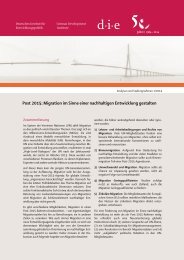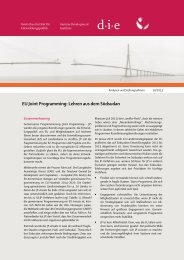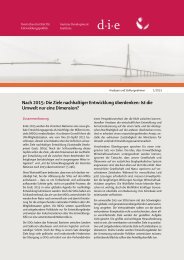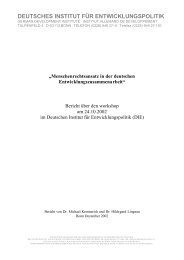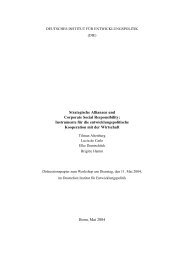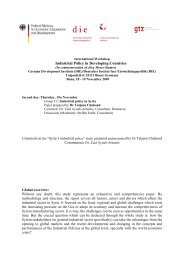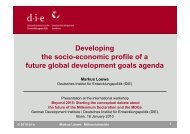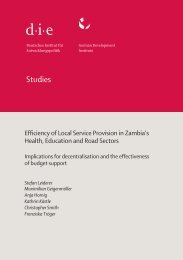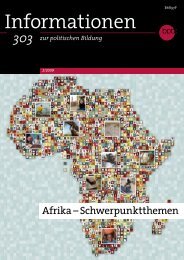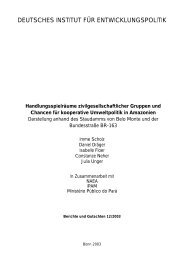Middle East / North Africa and the Millennium Development Goals ...
Middle East / North Africa and the Millennium Development Goals ...
Middle East / North Africa and the Millennium Development Goals ...
Create successful ePaper yourself
Turn your PDF publications into a flip-book with our unique Google optimized e-Paper software.
<strong>Middle</strong> <strong>East</strong> / <strong>North</strong> <strong>Africa</strong> <strong>and</strong> <strong>the</strong> <strong>Millennium</strong> <strong>Development</strong> <strong>Goals</strong><br />
between legislation <strong>and</strong> interpretation of <strong>the</strong> law, because <strong>the</strong> shari’a provides<br />
for ‘equivalent’ but not ‘identical’ rights for men <strong>and</strong> women. Under<br />
<strong>the</strong> shari’a, women have, in practice, inferior rights, particularly as far as<br />
civil-status <strong>and</strong> inheritance laws are concerned. Yet, nearly all MENA<br />
countries have integrated <strong>the</strong>se areas of Islamic law into <strong>the</strong>ir national<br />
laws, while <strong>the</strong>ir commercial, contract, public, <strong>and</strong> social welfare laws go<br />
back to European roots (Abou-Habib 2003, 67; Elsadda 2004).<br />
This is why women continue, in many regards, to be explicitly discriminated<br />
against by national law in <strong>the</strong> countries of <strong>the</strong> region. This goes in<br />
particular for women’s rights when <strong>the</strong>y marry, during <strong>the</strong> course of <strong>the</strong>ir<br />
marriage, when <strong>the</strong>y are divorced, in child-rearing <strong>and</strong> education, in cases<br />
of inheritance, in passing on <strong>the</strong>ir nationality to <strong>the</strong>ir children (see Box 1).<br />
This discrimination is especially pronounced in Yemen, Saudi Arabia <strong>and</strong><br />
<strong>the</strong> o<strong>the</strong>r Gulf states, <strong>and</strong> in Iran. Tunisia <strong>and</strong> Morocco in particular, but<br />
also to a lesser extent Egypt <strong>and</strong> Algeria, have gone much fur<strong>the</strong>r toward<br />
liberalizing <strong>the</strong>ir civil-status law than <strong>the</strong> o<strong>the</strong>r countries of <strong>the</strong> region (see<br />
Table A6, Annex, for a number of examples).<br />
But women also suffer discrimination in o<strong>the</strong>r spheres of law. To cite a<br />
few examples: For example, in some of <strong>the</strong> MENA countries, women are<br />
not allowed to run an enterprise or borrow funds from banks without <strong>the</strong><br />
permission of <strong>the</strong>ir husb<strong>and</strong> or fa<strong>the</strong>r; <strong>and</strong>, in some cases, women are not<br />
allowed to travel without male escorts. Iranian women are even not allowed<br />
to sit next to men at work or in busses (Salehi-Isfahani 2004).<br />
But just as serious if not more serious is <strong>the</strong> discrimination against women<br />
in legal practice, which may deviate substantially from statutory law. One<br />
reason for this is that beside national legislation <strong>and</strong> Islamic law (shari’a)<br />
<strong>the</strong> customary law of individual tribes or population groups continues to<br />
play an important role in <strong>the</strong> administration of justice. As examples here,<br />
Würth (2004, 11) cites <strong>the</strong> practices of female genital mutilation still<br />
common in some countries of <strong>the</strong> region <strong>and</strong> ‘honor killings,’ which, while<br />
officially outlawed <strong>and</strong> condemned by most Islamic legal scholars, still<br />
continue to be tolerated in many cases.<br />
German <strong>Development</strong> Institute 63



